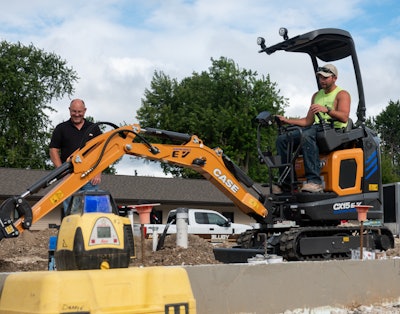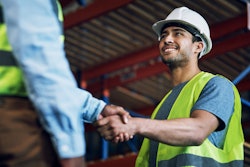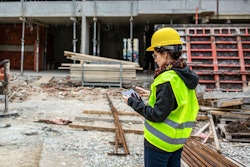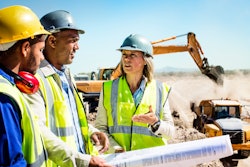
At the ARA Show in New Orleans in February, Equipment World caught up with Leandro Lecheta, CNH Industrial’s head of construction equipment for North America. Lecheta oversees both the Case Construction Equipment and New Holland Construction Equipment brands and the CNH Industrial Aftermarket Solutions business — the company’s parts and service organization.
Below he shares his thoughts on the state of the industry, the possible impact of the presidential election, if more heavy machine launches are on the horizon, and where the company is placing its technology bets.
 CNH Industrial
CNH Industrial
Lecheta: We are technically defining it as a mixed bag. Residential is slowing down a little bit because of interest rates, except for some spots in Arizona and Texas that are still okay. Non-residential is also declining a little bit, especially because we built too many warehouses last year. Manufacturing is okay but not a major investment area.
Then, you have another bucket, which is all the infrastructure projects, which are moving at an attainable pace. When it was launched, we were concerned about, ‘Hey, it's going to happen too fast, and we're not going to have machines, operators, or anything ready.’ But at the end of the day, the speed of the execution was okay, and everybody's tracking.
But now, there is a big question mark about elections. Internally, if Biden gets reelected, we just get through. If Trump gets reelected, things can change overnight. I don't think he's going to stop everything, but to be honest, he’s probably going to say, ‘hey, you know what? We're not investing the money in the right spots, stop everything.’ And then a few months later, he's going to come out with a Trump program because infrastructure in the U.S. is much needed.”
The other big piece of it is just the talk of the recession. We started talking about the recession probably around July or August of last year. The problem with recession is that when you start talking about it, everybody can decide to push it back. So, the rental business has been really down over the last three to four months.
EW: How are your dealer inventory levels?
Lecheta: We are okay. This is a sad story because it’s not just us. Most of the OEMs got hit with COVID in the second half of 2020, and we did everything we could to stop manufacturing activity. Then, we saw the rebound in ’21 and ’22 and that was a nightmare to keep our plants producing. Still today, we have some hiccups on the logistics because we have the Suez Canal. We didn’t have enough vessels; it was hard to tell when parts were arriving; and suppliers were falling apart.
So, from the end of ’22 to the beginning of ’23, when you start catching up in production, for example, where we produce the skids and CTLs, we jumped from two shifts to three shifts in three months. We hired 400 people in three months, so that was really complex to manage. Then, when we got up to speed, we saw the market slowing down a little bit. We reduced production and reached a level of inventory that is kind of high but manageable.
The problem that we have is we have to react to a potential down market because of the chance of a recession. So, total inventories are okay, but when you look by niche, it varies by machine and by dealer.
EW: Case CE and Hyundai just signed a technology investment partnership. Tell us a little bit about that collaboration and how it will impact your machines in the future.
Lecheta: To go back a few steps, a couple of years ago, we had a major investment in technology coming from Raven – machine control and precision control.
One year ago, we acquired Hemisphere, a special vendor in precision guidance. They basically do two things: produce the hardware, which is the GPS antenna that connects to the satellite, and they also have the capability to write software that communicates between the machine and the satellite.
We have this technology, and we’re going to start the work to include precision technology and machine control as a factory fit in our machines because in the past, we had agreements with Leica, Trimble, and Topcon. So, with that, especially on the excavators, mini excavators, and dozers, we are going to have our technology in them—the hardware and the software.
With Hyundai, where we are today is we have two sources of mini excavators: Hyundai and Sampierana, which is 100 percent CNH. We are developing an Innovation Center and cooperation on where we're going to cross-share technologies. For example, they are super strong in camera technology. They have the ability to have a 360-degree camera with object recognition to stop the machine if a human is detected.
We’re going to keep it separate, but the most important point is to have a joint collaboration between engineering and digital to develop where both of us are weak in terms of technology, sharing investment, sharing the technology, and speeding up the resources of both to come back to the market.
It’s going to be based in the U.S., and we’ll have people from both sides there. Right now, we’re still defining the details on where it's going to be, who is going to be in charge, investments, and things like that.
It’s good news, especially for Case. In the last 18 months, we launched 35 new products or next-gen versions, so getting up to speed with this technology is lots of work, but we are super excited about Hyundai and the collaboration. It’s not just about the mini excavators but the big excavators and the dozers—all the technology where we believe we can move really fast.
EW: Will we soon see more heavy equipment machine launches from Case and New Holland? Many of the recent launches have been in the compact space.
Lecheta:
We just launched, in another collaboration with Hyundai, our wheeled excavators, and we are working on some other models.
From a strategic standpoint, the big market is on the compact side. Of course, we have Case dealers focusing on general construction – big machines – but we have Case and New Holland Construction, so we also sell lots of construction equipment under our ag network and there is still lots to be explored there. We still have many dealers that don’t sell any of the construction equipment for whatever reason – they are coming from the heritage to have Kubota or Bobcat or someone else – so we’re starting to speed up on these.
For example, with the Utility Plus backhoe loader, which is a lower cost to the final customer, we can have a much better penetration with farmers, landscapers and rental companies.
The MTL industry is now 25,000 machines a year, so it’s a strategic internal debate.
EW: You now have electric machines on the market and have shown other alternatively powered concept machines at trade shows. What direction is CNH taking when it comes to alternative power solutions?
Lecheta:
Currently, we have the electric backhoe and electric mini excavators, and we are bringing the electric compact wheel loader from Europe. We have plans to develop an electric CTL and skid steer, as well as an electric MTL. So, we have many products betting on the electric version.
We believe the future is electric and that we can have some other alternatives, as you said, with methane and other sources. Five years ago, we started having discussions about the future of alternative combustion. We have big bets today that we’re going to be more accelerated on the take rate of electric machines.
We’re seeing a little bit of a lag in terms of adoption, maybe because the machines are more expensive. Depending on the machine, it can be three times the cost of a diesel machine but with some big advantages in terms of no pollution, no noise, and no maintenance at all, but we believe that this is where machines are going to go, depending on the size of the machines. We believe electric is going to be more on the compact side of machines.
Technology is quickly advancing on electric machines. When we started running projects three years ago, we could run these machines for two hours. Now, we can run for eight hours. With all the technology coming from the batteries and software that controls the machines, we see easily those machines achieving the same operational cycle as a diesel machine in the next couple of years.
We’re betting that electric machines are here, and they’re going to stay. We’re going to see more offerings in the next two to three years, but to be honest, we’re slowing down a little bit. Because it’s a different machine with a different approach, it’s not the usual customer that is going to buy these machines. There are lots of federal incentives with these machines, so we’re creating a business unit to look at these businesses as a whole and start creating more uses for our customers.
There are still some unknown facts about buying a machine like this. If it’s going to be three times the price of a regular machine, what is going to be your residual value or trade-in value five or seven years from now? It’s a big unknown.
What we’re doing from an OEM perspective is working with our dealers to make sure that we put some incentives to have our dealers really into the electric machine, but offering competitive leasing where the customers can walk out if he needs, which gives the customer the experience to run those machines.












